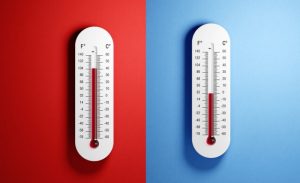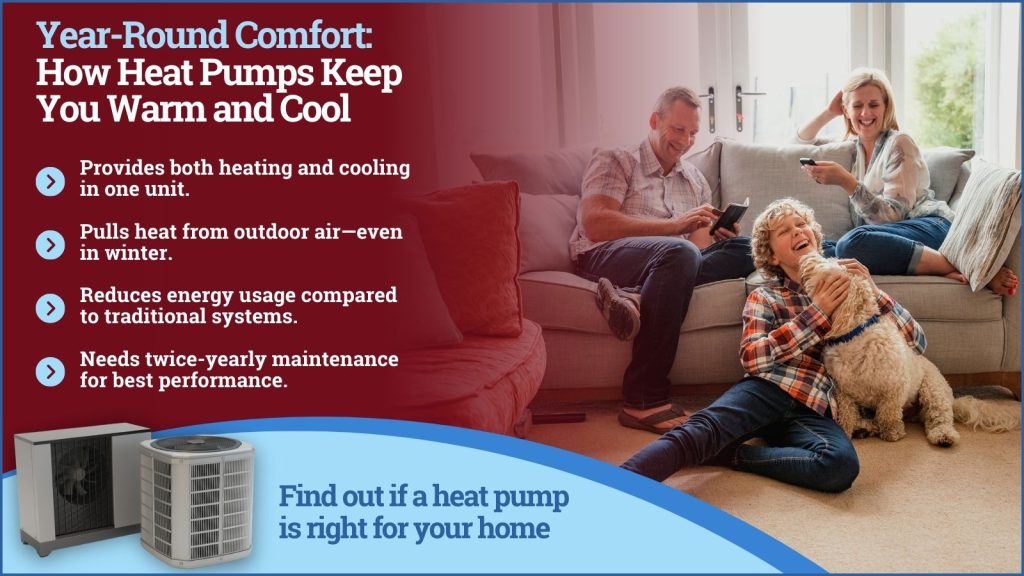
Heat pumps are gaining popularity as an energy-efficient solution for year-round comfort—but how do they work? Unlike traditional HVAC systems that generate heat through combustion or electric resistance, heat pumps move heat from one place to another. This allows them to function as both a cooling and heating system, making them a versatile and eco-friendly choice for many homeowners. Read on for more details about heat pumps in Duluth, GA.
How does a heat pump work to heat and cool your home?
A heat pump moves heat instead of generating it. In heating mode, it pulls warmth from the outside air and transfers it indoors using a refrigerant cycle. In cooling mode, the process reverses—extracting heat from inside the home and releasing it outdoors. This allows efficient year-round comfort using minimal energy.

How Heat Pump Technology Works
At the heart of a heat pump is the refrigeration cycle. During warmer months, a heat pump operates much like a standard air conditioner. It uses a refrigerant to absorb heat from inside your home and releases it outdoors, thereby cooling the indoor air. The process involves four main components: the evaporator coil, the compressor, the condenser coil, and the expansion valve.
But what makes heat pumps stand out is their ability to reverse this cycle. When heating is needed, the heat pump switches modes using a device called a reversing valve. Now, the system pulls heat from the outdoor air—even when it’s cold—and transfers it indoors. For more insight, see common reversing valve malfunction symptoms, which can impact performance and comfort. Thanks to the refrigerant’s properties, heat can be extracted from outdoor air as low as 20°F or even lower with cold-climate models.
How Heat Pumps Heat from Cold Air
It may seem counterintuitive, but there is always some heat present in the air, even on chilly days. Heat pumps are designed to capture and concentrate that heat. The refrigerant absorbs the heat, the compressor amplifies it, and the system delivers the warm air into your home. This is what makes heat pumps far more efficient than traditional electric heaters or even many gas furnaces.
Energy Efficiency Advantages of Heat Pumps
One of the biggest advantages of heat pumps is their efficiency. Because they move heat rather than generate it, they can produce three to four times more energy in the form of heat than they consume in electricity. This makes them a great choice for reducing energy bills and lowering your home’s carbon footprint. You can explore more about how heat pumps improve energy efficiency and contribute to long-term savings.
Additionally, modern heat pumps come with variable-speed compressors and smart thermostats, which allow for more consistent comfort and better humidity control.
The Importance of Professional Heat Pump Installation
To get a heat pump’s full benefits, it must be properly sized and installed. An oversized or undersized system can lead to poor performance, higher energy bills, and a shorter system lifespan. A professional HVAC technician will evaluate your home’s insulation, square footage, climate zone, and more to recommend the right type of system and ensure it is installed according to manufacturer specifications. Learn more about installing a heat pump system if you’re considering one as your next cooling upgrade.
Improper installation can also affect refrigerant charge and airflow, which are critical to the system’s efficiency and reliability. Don’t leave such an important investment to chance—always trust certified professionals for installation.
Biannual Heat Pump Maintenance Tips
Since heat pumps are used year-round, both for cooling and heating, they require maintenance twice a year—once in the spring before cooling season and once in the fall before heating season. Regular maintenance includes checking refrigerant levels, inspecting electrical components, cleaning coils, and ensuring all parts are operating properly.
Routine tune-ups prevent breakdowns, improve energy efficiency, and extend the lifespan of your system. Neglecting maintenance can result in reduced comfort and expensive repairs down the line.
Conclusion
Heat pumps offer an all-in-one solution for efficient home heating and cooling. With their innovative technology and dual-season functionality, they’re a smart investment—but only when installed and maintained by experienced professionals. Schedule your heat pump tune-up today to ensure year-round comfort and performance.
Frequently Asked Questions
Question: What exactly is a heat pump and how does it differ from a furnace or electric heater?
Answer: A heat pump transfers existing thermal energy rather than generating heat. It works like a reversible air conditioner—using refrigerant, compressor, evaporator, condenser coils, and an expansion valve—to move heat indoors in winter or outdoors in summer. This makes it more energy-efficient than traditional heating systems.
Question: How can a heat pump keep a home warm when outside temperatures are near or below freezing?
Answer: Heat pumps can extract heat from cold air—even as low as 20 °F or −30 °C in cold-climate models. The refrigerant absorbs outdoor heat, the compressor raises its temperature, and the system transfers that warmth indoors. Highly efficient models maintain over 300% efficiency in low temperatures.
Question: Why is correct installation and maintenance important for heat pump performance?
Answer: Proper sizing, correct refrigerant charge, and good airflow are essential for efficiency and lifespan. Certified technicians ensure systems match your home’s insulation and climate. Biannual maintenance—before heating and cooling seasons—keeps refrigerant levels, coils, and electrical components in optimal condition.
Reach out to Wall Heating & Air Conditioning, Inc. with any inquiries or to make an appointment.
